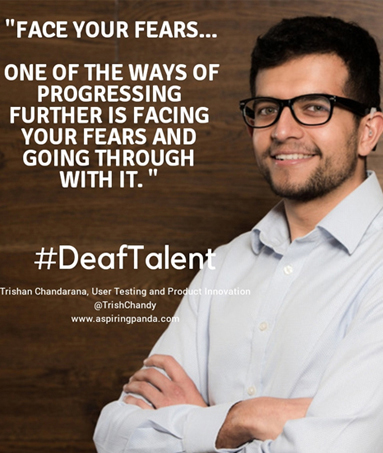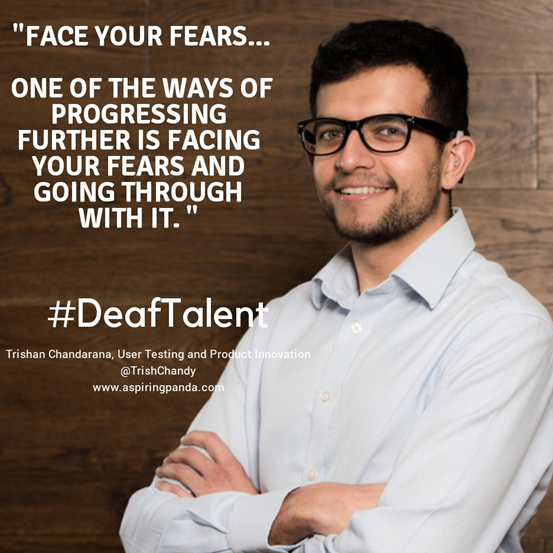Diversity at Aspiring Panda
Guest blog by our Usability Tester Trishan Chandarana who shares his experiences as a Deaf person working in our team.

/ Insights / Diversity at Aspiring Panda
Diversity at Aspiring Panda

Guest blog by our Usability Tester Trishan Chandarana who shares his experiences as a Deaf person working in our team.
According to UK government statistics published in October 2017, only 65% of working age deaf people are in employment, compared to 79% of the general population. * Moreover, many deaf workers face barriers in the workplace.
As a bilateral cochlear implant user, I can converse with small groups of hearing people without any need for additional support apart from my own strategies such as asking them to repeat, speak slowly or face me in order for me to lip-read them.
I work with the same team on a daily basis at the Aspiring Panda office based in Harrow. Overtime, we have built up strong relationships which makes it easier to understand each other. Furthermore, when working with my colleagues in India I often use written methods of communication. Whenever I need to partake in a telephone conversation, my colleague will write down what the caller is saying on a piece of paper or repeat what they are saying to enable me to lip-read. I make the most of opportunities given to me in this company such as meeting clients and public speaking.
Meeting new people
Whilst Aspiring Panda is very accommodating to my needs, I still have a fear of meeting new people in a formal environment like a networking event mainly because I am unsure whether I will be able to understand them. I was asked to attend the Bett Show, a trade show marketing technology in the education field, at the ExCeL exhibition centre in January. I was apprehensive on going at first but after some encouragement from my colleagues, I took the plunge and went. During the event, I sat at the front whenever a seminar was being held ensuring I could lip-read the speaker, I also took voice notes which was useful for the team as well.
In March, I was asked to pitch an in-house app at the Harrow Business Den to a panel of four judges alongside a colleague. This consisted of five minutes pitching and ten minutes answering the questions from the judges. Naturally, I was nervous speaking in public to an audience of a hundred people demonstrating an app live. Several concerns came to my head like forgetting my lines or technical faults during the live demo. But, none could beat the main fear I had of misunderstanding the judges’ questions and answering the wrong question. To ensure that I could make the best use of this opportunity, I requested for a British Sign Language (BSL) interpreter and Harrow Council who hosted the event were happy to provide me with one. I have had experience with an interpreter during school but never requested one for work. The pitch exceeded our expectations and I understood the judges’ questions. We were inundated with enquiries and praise from the public about the app and our performance. Having a BSL interpreter not only supported me in answering the questions but it provided a statement in the room that I am Deaf and people naturally adjusted themselves when speaking to me.
Tips for employers or colleagues of deaf workers
Employers and colleagues can adjust the working environment to cater for deaf people’s needs easily by using the following tips:
- Change the seating arrangements in a meeting/group task in a way that a deaf employee can lip-read everyone.
- Speak slowly and one at a time, we only have one pair of eyes to lip-read.
- When doing a presentation, provide a transcript or include most of the content in the presentation, this is beneficial for everyone in future.
- During conference calls, have someone taking notes of the conversation. You can use this for reference afterwards.
- Hold classes teaching Deaf awareness or basic sign language to educate all employees on how to work with deaf people.
Tips for deaf employees
Deaf employees can use the following tips to progress in their career:
- Ask for help from the employer – in most cases they are willing to help.
- Face your fears – one of the ways of progressing further is facing your fears and going through with it.
- Use government initiatives such as Access to Work to acquire interpreters or aids to make the workplace accessible for you.
- Take extra courses to boost your skills – there are plenty of free online courses available that you can use to upskill yourself.
Whilst all of the tips mentioned above may work for me, every deaf person is different so it is important to discuss with them how best to accommodate to their needs.
If you have any more tips you would like to share or even a blog describing your experiences in the workplace please do not hesitate to give the Aspiring Panda team a call…
Just kidding! Drop them an e-mail on info@aspiringpanda.com and they will happily share their experience from an employer perspective.

Digital marketing and tech specialist Anoop is a well-known figure in the Harrow and North London community. Currently the Operations Director for Aspiring Panda, the company uses cloud and development expertise to solve some of the toughest business challenges – which has recently included consulting with East African nations to provide sustainable farming.
/ Related Content


